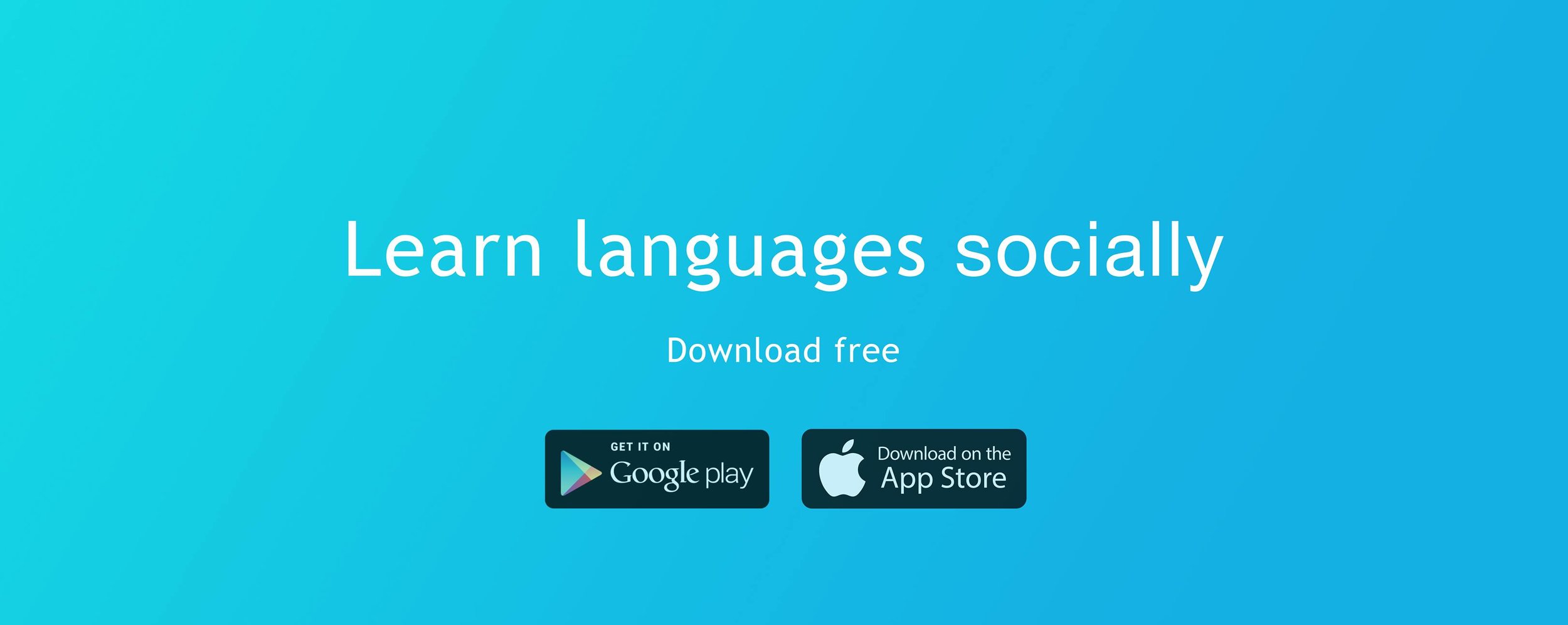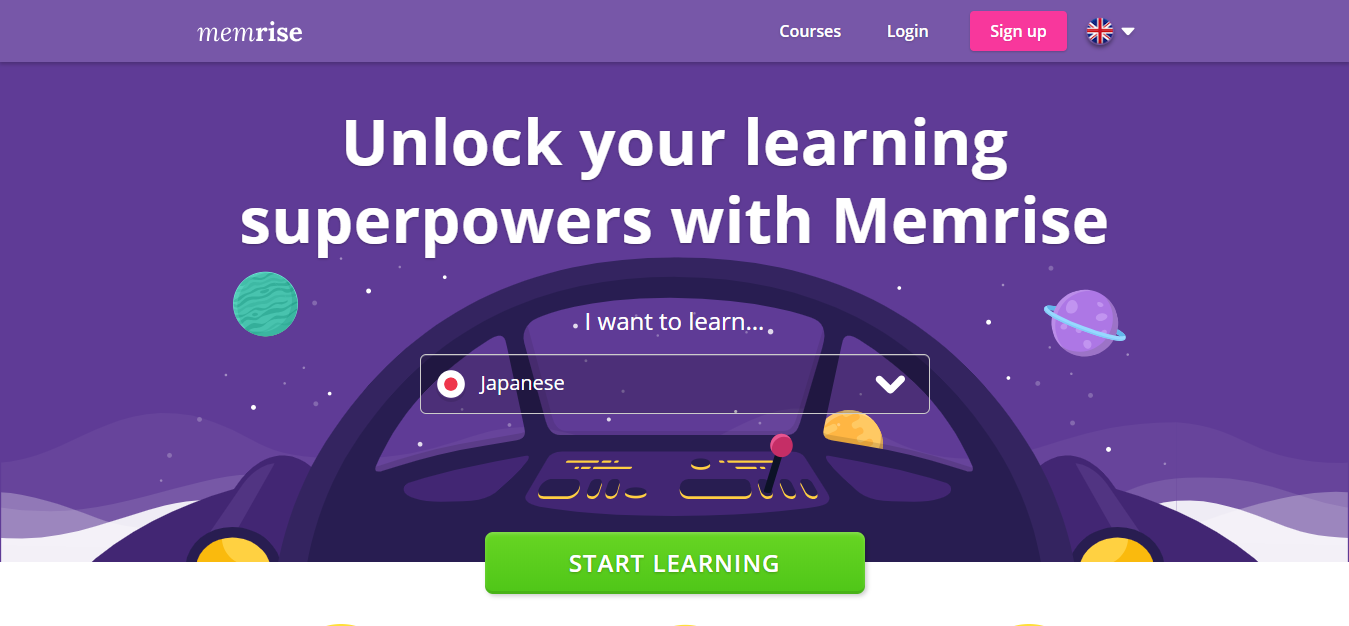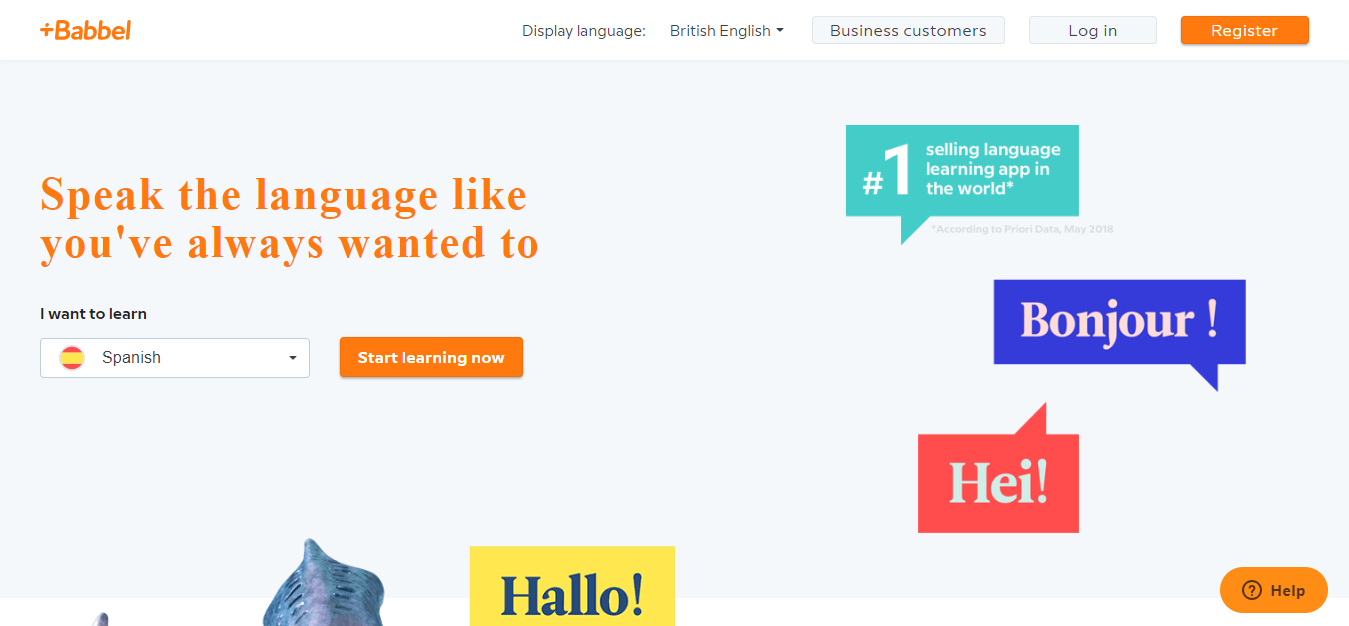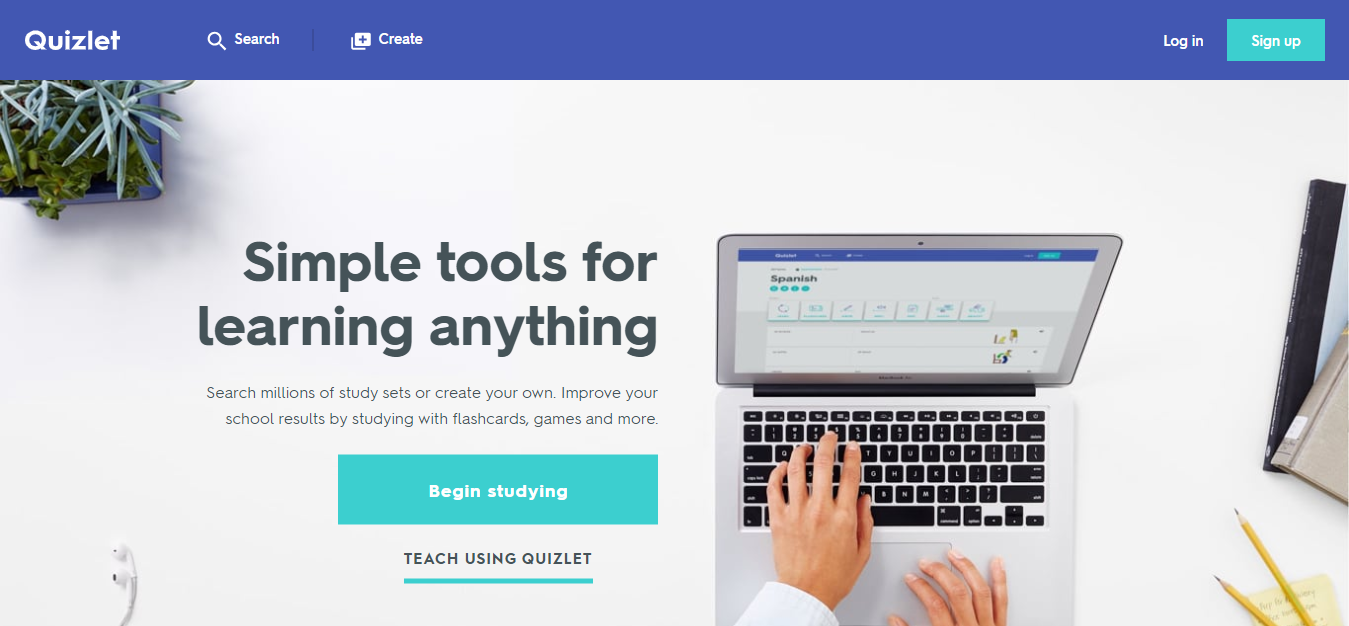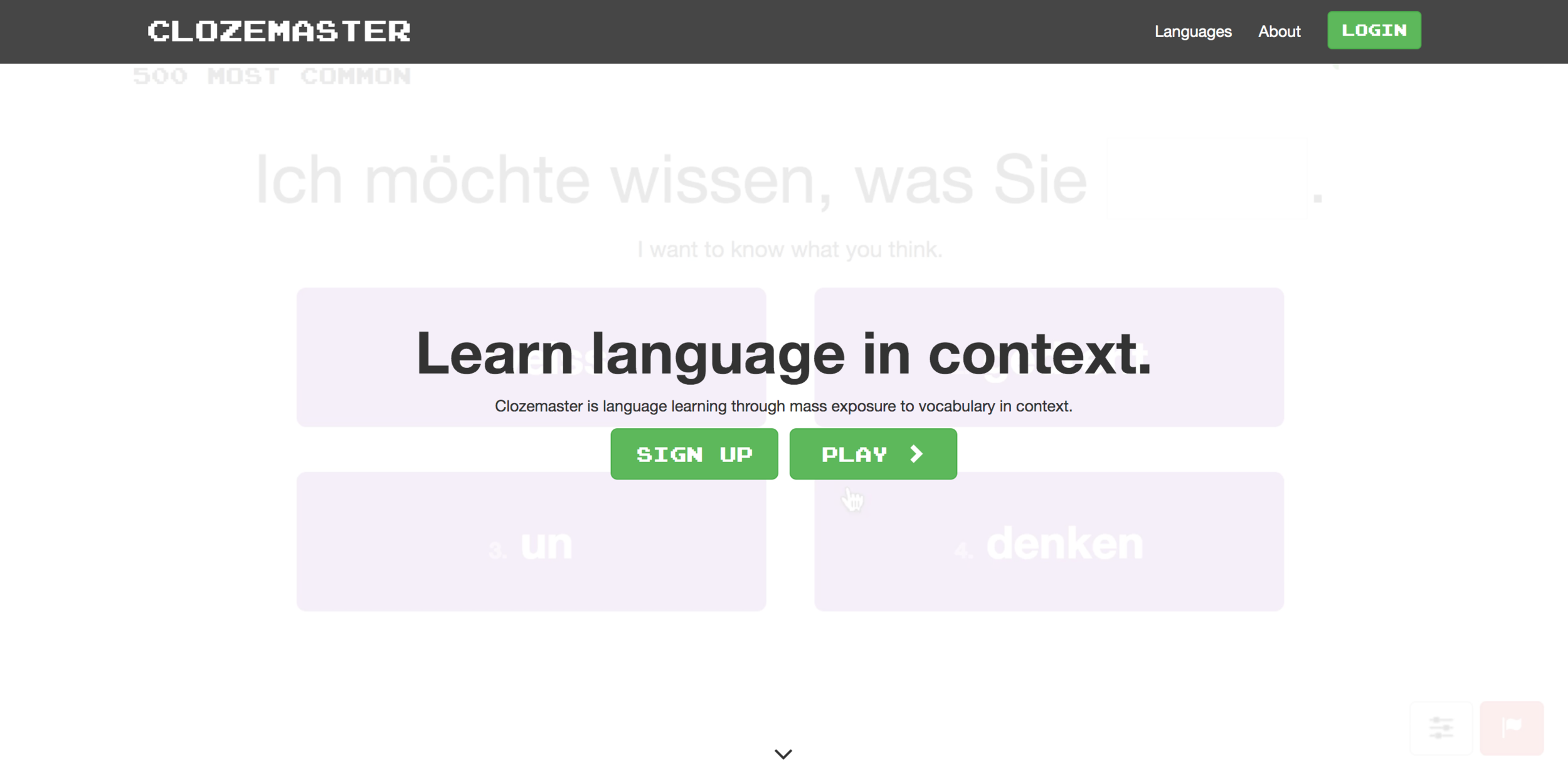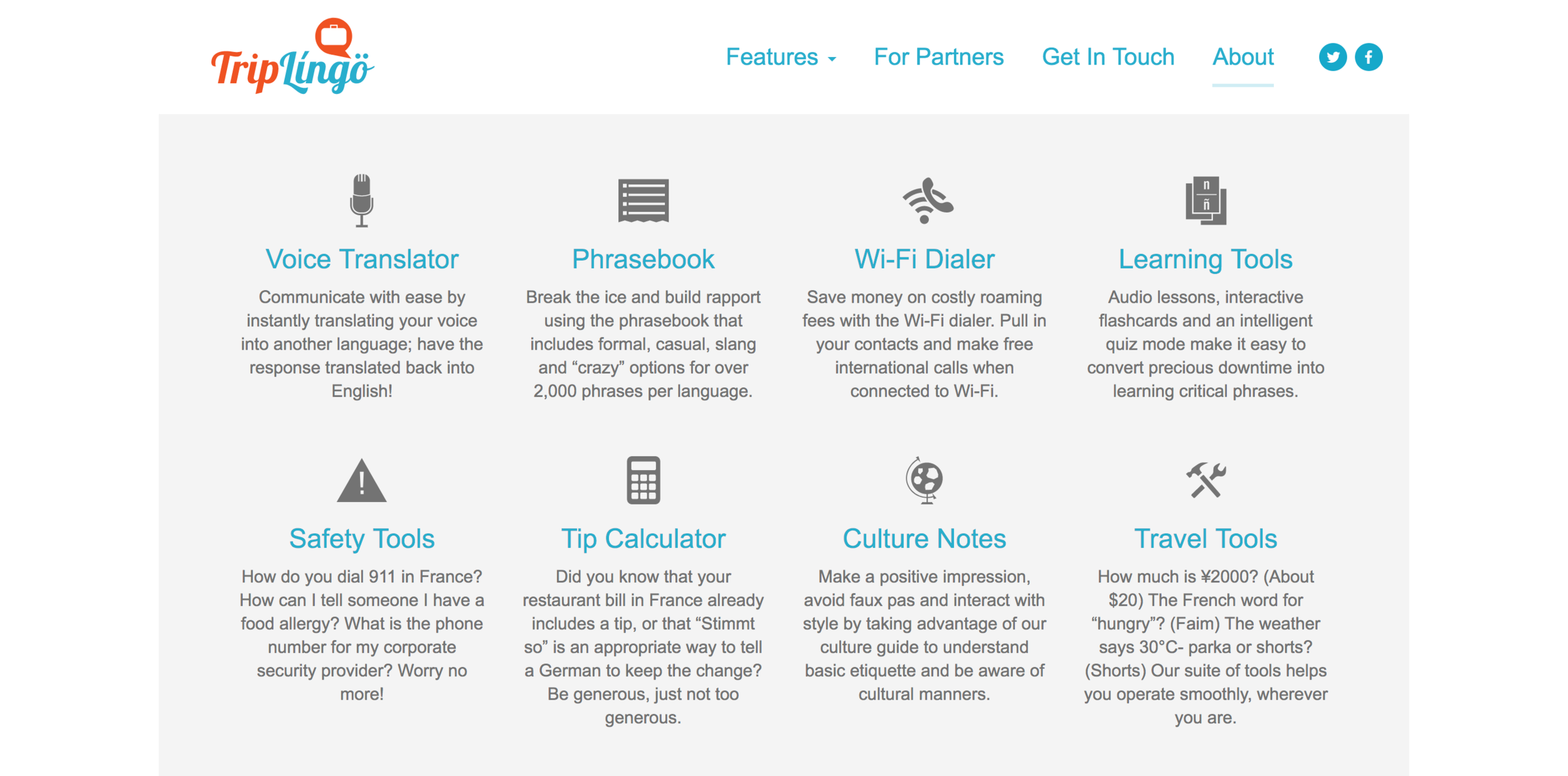The 15 Best Language Learning Apps for Fluency in 2020 (Updated!)
Best Language Learning Apps
You’re here because you're looking for language learning apps so you can keep learning anytime, anyplace, anywhere.
For an in-depth look at our seven favorite tools check out our best language learning software article.
If you want to see a little more variety and some extra interesting concepts keep reading!
Here are some quick links to all the tools we recommend. Scroll down for an overview of each one!
Our best language learning apps:
Our extra best language learning apps:
Duolingo: Best language learning app
Duolingo has to be top of our list. The largest language learning app in the world boasts over 200 million users; a huge community with varied interests which Duolingo has been developing new language courses for.
You can anything from Spanish to Klingon with Duolingo.
One of the things which makes Duolingo so good for users is that it is free. Sure, you have to look at adverts every time you complete a mini-lesson, but that is of little inconvenience. If you want to pay and support Duolingo then it’s not expensive to buy the premium product which means you can hide adverts, access a small amount of gated content, and feel happy that you are supporting the learning of others.
Duolingo tests you on your vocabulary, on your grammar, and even uses voice recognition to try to test your pronunciation.
All of the learning through Duolingo is undertaken through small games. These games normally involve selecting the correct words in your language to translate a sentence from the language you are learning, matching words with their translations, and selecting the correct sentence from a selection of similar options.
That is, no long lists of vocabulary and no conjugation tables.
Duolingo works very well to learn the basics of a language and can work as an excellent refresher for someone who is at an intermediate level. I still regularly go back to Duolingo to keep myself sharp.
Highly recommend.
Idyoma: Best language exchange app
Idyoma is based around the idea that because language is a social tool, we should find a social way to learn it. With Idyoma you can find other language learners in your area who you can meet with to practice, share cultures, and have fun.
Structurally Idyoma is probably most similar to Tinder - an app we all know and love. The difference with Idyoma is that your goal would be to meet with anyone who has a corresponding language skill set to you. Of course, this also means that you can get significant value by connecting with a person who is not in your area, for example, via a video call conversation.
In Idyoma, you have two ways of searching for language partners. You can search your local area or you can search globally based on the language you want to learn. So, for example, I could open up Idyoma and find a Spanish speaker who wants to practice English in my area here in Seville, or I could go onto the worldwide screen and look through all the Spanish speakers on the app. Maybe I would connect with a person from Colombia or Peru. I could then chat with them in the app or via video call.
The best part about it is the ability to find people local to you. However, it is still very useful to be able to look globally and find a large number of people.
In terms of features, Idyoma has a clean visual interface where you can see multiple photos from the person you are considering meeting with - it uses a card structure so that you can swipe between different users. When you are having a conversation with another user in the chat screen you can Auto Translate messages and also recommend Corrections to someone else's message.
Idyoma is free but has a small verification fee for people who want to prove they are not a robot and want to help support the application.
You can download Idyoma for iOS here: Idyoma: Language Exchange
And for Android here: Idyoma: Language Exchange
Memrise: Best gamified language learning app
Memrise is a really good gamified language learning application. When you are using the app it does feel like you are playing a game and it is very easy to feel invested in your progress.
When someone describes an app as being gamified, what they may mean is that the app contains a narrative and a series of goals, and an interactive method to achieve those goals within the scope of a broad narrative. This could, for example, be done through earning points and being able to exchange those points for something else in the app which helps you complete a level. This kind of technique is utilized by many apps, particularly learning apps. Memrise uses this technique very effectively to help keep you interested, motivated, and engaged with your language learning efforts.
Memrise has a really large range of different languages within its platform which you can choose to learn. You can access this huge database of languages for free and you can access a load of really cool added features in their premium package; features like an interactive chatbot.
In my opinion, Memrise is best for improving your vocabulary. However, Memrise can be really useful for improving your grammar and learning conversational phrases too.
The app provides a parallel with Duolingo in that you can start learning a language from the point of having zero knowledge or experience and suddenly find yourself at a basic conversational level when you finish the course.
In the premium package you will also find a large library of videos from native speakers of the language you want to learn, along with many more games as well. This gives the premium package from Memrise a real edge because buying it provides you with significant value as a learner - not something all premium accounts deliver.
I can't finish talking about Memrise without mentioning its wonderful design. Through the gamified nature of the platform Memrise has found a way to present the design in an ambitious and adventurous way.
It makes the platform a pleasure to use.
Mondly: Best virtual reality language learning app
Features like grammar tests, interactive workbooks with question-and-answer scenarios, and over 33 languages make Mondly a strong choice for anyone deciding which is the best app for language learning.
However, Mondly deserves special mention for its unique and immersive virtual reality setup.
This allows you to partake in simulated conversations in a variety of virtual environments, which adds a depth to the experience of language learning second only to face-to-face interaction.
For people who find communication with others difficult, or simply prefer to learn in solitude, Mondly offers an enticing alternative to full real-world immersion.
This narrative aspect is a huge component of learning and memorizing a new language.
Mondly is also a great enterprise option, with a specialized product available for businesses interested in improving the language skills of their employees.
Any company looking to provide language training should strongly consider Mondly.
Babbel: Best conversational language learning app
"Babbel" is the imperative mood of "babbeln", which means "to chat" in a certain West German dialect. It's also a pun on the Tower of Babel, the story of which is about why there are so many different (and mutually incomprehensible) languages.
It's also the world's highest-selling language learning app, second only to Duolingo in raw downloads.
Babbel's approach is similar to Duolingo, focusing on short sessions of an interactive workbook that present you with tests, grammar and word problems, and similar exercises.
The difference is in how Babbel's courses are structured.
Designed with conversations in mind, the aim is to help you get better at conversing in your language of choice.
In that sense, Babbel's main focus is conversational language learning, where importance is placed on listening to, and reading the other side of the conversation to properly comprehend the discussion.
Babbel is a paid app, with a large variety of subjects and talking points to choose from. Lessons are split up into short 15 minute segments, so it's easy to pick up during a commute or on a lunch break.
Italki: Best language tuition app
If you're considering language tuition, you may have investigated your local language schools. That's great, if you happen to live in an area which can cater to your interests.
But for many people, especially those interested in less common languages, there simply are no viable options for local language tutoring.
That's where Italki comes in.
Italki's value proposition is 1-to-1 language tutoring from teachers all over the world.
You can search for teachers who are native speakers of the language you're interested in learning, with the option to video chat.
You can even specify that your teacher needs some (or even extensive) knowledge of your native language if you'd like.
The strength of Itaki is in its flexible and varied pricing, with options for all levels of specialization and formality. You can find a tutor who fits your schedule, your budget, and your level of proficiency.
Simply arrange a time to chat and get learning ASAP!
Quizlet: Best vocabulary learning app
Quizlet is a language app with a focus on highly customizable vocabulary learning.
You start by choosing a bunch of words or phrases you'd like to learn, and Quizlet lets you pick and choose what you deem to be the best way for you to learn them.
This approach recognizes that different people learn in different ways. Some people learn better with immersive word association; others prefer a simple paired list of words with their translation.
With this method you can build your ideal language learning course. If you want to build it out to be similar to Duolingo's approach, you can do that. If you prefer a Memrise-like structure, you can do that too.
You can build your course exactly how you want it.
But that's not all - Quizlet could also be called the "best language learning app for community content", because, well, there's a lot of community content! Over 270,000,000 to be exact.
For every new course (or "set", as Quizlet calls them) that you build, you can set it to be either public or private.
Public sets are then available for any Quizlet user to use for themselves.
Although, not all of Quizlet's content is focused on language learning, as it's used by all kind of teachers and students to improve their knowledge of just about any kind of vocabulary you could imagine.
Nonetheless, with its combined customization and community content, Quizlet is without a doubt one of the best language learning apps available.
Busuu: Best versatile language learning app
There are a lot of language learning apps available. Some of them offer highly customizable lesson plans, some of them offer ready-made courses for you to get started right away.
This can be confusing. How do you know which will work best for you? Maybe you want a bit of both, or are curious about testing some different approaches.
If this sounds familiar, then look no further. Busuu, (stylized as busuu) is a versatile language app for learners of all proficiencies.
What do I mean by "versatile"?
I mean that busuu offers a safe "middle way" between the highly customizable offering of Quizlet and the highly structured solutions of Duolingo. It has a bit of both!
You'll start by taking a placement test to make sure your lessons match up to your skill level, and from there you can navigate to the language of your choice from the busuu dashboard.
Each language has about 150 units, and all of busuu's modules are extremely well-organized. You will build on what you already know and utilize customizable tests and print-outs to learn at your own pace.
You also have the option to have your exercises corrected by a native speaker, for an additional measure of quality.
Rosetta Stone: Best language learning app for speech recognition
When it comes to language learning apps, if you haven't heard of Rosetta Stone then there's a pun in there somewhere.
Since 1996, Rosetta Stone has offered "dynamic immersion" language learning in the form of its signature software, pairing sound and text to images to facilitate learning.
The app follows in this lineage, focusing on practical scenarios and speech-recognition to improve your accent, in 24 different languages.
You can also download a bunch of the learning material for offline learning, which is a huge bonus for those wanting to save on data, or for offline sessions.
Rosetta Stone's experience in the language learning software industry, and the sheer amount of time they've been offering and refining their audio-based language learning solutions for clarity of pronunciation has earned it a place on this list.
Beelinguapp: Best language storytelling app
Whether you're watching Spanish telenovelas, reading Japanese manga, or using Beelinguapp, some people find that storytelling empowers their learning ability.
Specifically, Beelingu is focused on improving reading skills by offering mirrored text in two separate languages simultaneously.
You can choose from a range of stories at different levels of proficiency, in Japanese, Arabic, Korean, Chinese, Hindi, Turkish, French, Russian, Portuguese, Spanish, German, Italian, and English, with everything from news, science papers, fairy tales, and novels.
The app also offers an interesting "karaoke reading" feature, which is an audiobook that lets you listen as you read the mirrored text.
A great way to immerse yourself that isn't conversing!
Clozemaster: Best retro language learning app
Clozemaster requires some unpacking.
Simply put, it's a retro-themed app (for tablets, smartphones, and web browsers) that teaches vocabulary through gamification and a concept known as "cloze".
What is "cloze", you ask?
It comes from the term "cloze test", which is a way of testing comprehension by removing words from sentences. You can also think of it as a game of fill-in-the-gaps.
If you were trying to learn English, it'd look like this:
My _____ told me he thinks one of the best language learning apps is Idyoma.
You'd have a choice of options like "dog", "brother", "sister", "chair", "football".
Using your knowledge of the language, you'd infer the correct answer based on the options available. You're essentially learning the language through context.
Clozemaster is based on this method.
It utilizes Tatoeba, an enormous database of sentences designed for language learners, by taking sentences and blanking out the least common word.
Another perk of Clozemaster is that it's completely free. You don't even need an account (unless you want to save your progress; in which case you can make a free account).
TripLingo: Best language learning app for travelers
TripLingo is one of the only language learning apps designed specifically for travelers.
As you might expect, TripLingo focuses on useful phrases, and to that end it's a great crash-course resource for those looking to brush up before (or during) a trip.
Offering thousands of phrases, slang, audio lessons, flashcards, a translator, and quizzes for learning in 13 languages, TripLingo stands up as a language learning app outright.
But it really shines in its array of traveler-focused features like safety tools (how do you dial 911 in France? How do you tell someone you have a food allergy?), tip calculator, culture notes, and a whole suite of travel tools to aid the language-bereft wayward wanderer.
There's even a built-in wi-fi dialer for saving money on costly roaming calls!
AnkiApp: Best language learning app for customizable phrases and flashcards
Flashcards are a great way to learn languages. What AnkiApp offers is customizable flashcards, for learners who have specific word sets or vocabularies they want to learn.
Sure, some of the other apps on this list offer customizable flashcards. But AnkiApp offers a simple, streamlined solution, for those who simply want flashcards without any of the other features.
You can also search through a ton of community content in a wide range of languages, if you'd rather not spend time building flashcards yourself.
Definitely one to try if you are a fan of flashcards.
Moreover, it has a particularly strong cult following among those who are learning Asian languages. Some of the communities are practically Anki fan clubs. So if you’re learning Chinese, Japanese, Korean, or another Asian language, you should definitely check it out to see what all the fuss is about!
HiNative: Best Q&A language learning app
Last but not least, we have HiNative.
HiNative is a Q&A app that lets you ask any question you can think of to native speakers of the language you're trying to learn, with audio, image, and/or text support.
Because the format is quite conversational (you can ask about whatever you're interested in) it makes for a natural, fun way to build and practice vocabulary.
It's also informal and unstructured, so you have the chance to ask about things you may not find in some of the other offerings of this list, such as curse words (though that is far from the only way to use HiNative).
With over 100 languages, HiNative can be a great supplement to some of the other apps in this list, and deserves a mention if only for its unique offering.
LingApp
If having fun and being motivated are among your top language learning priorities, you can find a perfect match in LingApp. LingApp is a gamified language learning app, offering language learners over 60 languages to choose from.
This application provides learners with language courses filled with lessons covering all five language levels from beginner to advanced. What makes it stand out is its combination of short activities and interactive exercises that enable users to practice four language skills in just 10 minutes per day.
The bite-sized chunks of courses help students quickly grasp the language principles without dedicating hours of their day. In order to ensure that learners get exposure to native speakers' pronunciation, the application provides audio from native speakers in over 60 languages. Learners can also practice their skills by interactive speaking exercising with the AI chatbot.
If you want to go a bit further, you can utilize Ling Live which lets you get language tutoring by a language expert in online private sessions.
LingApp offers users to learn for free, but if you want to access more content and lessons you can get the premium version
What are your best language learning apps?
I've reviewed the best workflow apps, task management apps, BPM software, todo list apps, and productivity software, and people always have new apps they want to recommend in the comments.
So, go ahead and let me know! What are your favorite language learning apps? Do you know any hidden gems?
For more from Idyoma, check out these articles:
This article was written by Idyoma’s Adam Henshall and Oliver Peterson, who writes about processes, team tools, and systems for business process management and workflow automation platform Process Street. Oliver is learning Spanish.
Check out more from Process Street here:

